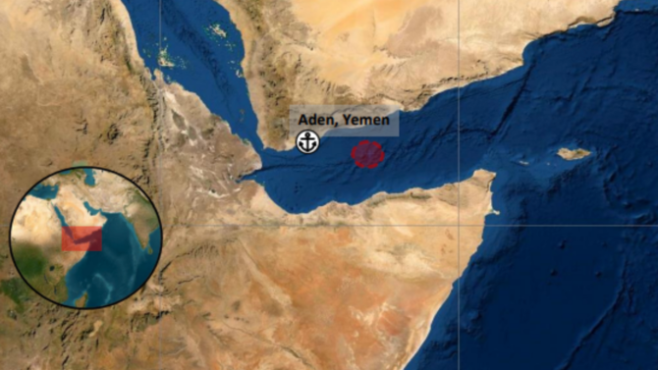Dutch Cargo Ship Ablaze After Explosive Attack in Gulf of Aden
The Gulf of Aden witnessed another flashpoint of maritime violence on Monday when the Dutch-flagged general cargo ship Minervagracht came under attack from an explosive device, leaving the vessel on fire and drifting helplessly in international waters. The incident has triggered an emergency rescue mission to evacuate the ship’s 19 crew members, two of whom have sustained injuries.

The attack was reported by both the ship’s Amsterdam-based operator Spliethoff and the European Union’s naval mission Aspides, which monitors maritime security in the Red Sea and surrounding waters. According to initial statements, the Minervagracht was sailing around 128 nautical miles southeast of the Yemeni port city of Aden when it was struck. The explosive device inflicted substantial structural damage, sparking a fire on board that forced the crew to abandon the vessel.
“Two of the crew of Minervagracht have sustained injuries. Currently the crew of 19 are being evacuated to nearby vessels by helicopter,” Spliethoff confirmed in its statement. The extent of the injuries was not immediately clear, but both the company and the EU mission stressed that swift evacuation was underway to ensure the safety of all on board.
The crew, consisting of nationals from Russia, Ukraine, the Philippines, and Sri Lanka, were reported to be in urgent need of assistance as the fire spread across the vessel. While helicopters ferried the injured and others to nearby rescue ships, the cargo vessel itself continued to burn, drifting in the busy shipping lane of the Gulf of Aden.
The identity of the attackers remains uncertain. Since late 2023, the waters of the Red Sea and the Gulf of Aden have been fraught with tension due to repeated assaults launched by Yemen’s Iran-aligned Houthi movement. The Houthis claim their maritime campaign is directed against vessels with ties to Israel or its allies, framing their actions as solidarity with Palestinians amid Israel’s war in Gaza. However, there has been no immediate confirmation linking the Houthis to Monday’s attack.
The EU mission Aspides, while acknowledging the seriousness of the incident, noted that the Minervagracht had not requested protection before the strike occurred. Aspides maintains a presence in the region to provide escorts and deterrence against attacks but requires vessels to coordinate their movements for adequate coverage. The mission described the ship as being “on fire and adrift” after the blast, underscoring the vulnerability of commercial shipping in the area.
The incident is likely to raise further alarm in international shipping circles, as the Gulf of Aden remains one of the world’s most crucial maritime routes. Vessels transiting between Europe and Asia routinely pass through these waters, and disruptions have ripple effects on global supply chains. Over the past year, several shipping companies have already diverted vessels away from the Red Sea due to heightened risks, choosing longer but safer routes around the Cape of Good Hope.
Maritime security experts say that Monday’s attack reflects a dangerous escalation of tactics in the region. While piracy once dominated concerns in the Gulf of Aden, the current wave of assaults involving drones, missiles, and explosive devices presents a far more destructive threat. Ships are not only at risk of boarding but of catastrophic damage that can leave them disabled at sea.
The plight of the Minervagracht also throws a spotlight on the human cost of such attacks. The crew, drawn from countries where many seafarers make their livelihoods, were suddenly thrust into a life-threatening situation far from home. Helicopter evacuations at sea remain high-risk operations in themselves, further compounding the peril faced by those on board.
As news of the attack spread, shipping and insurance markets braced for potential fallout. Each new incident adds to the financial strain of operating in the region, with insurance premiums for transiting vessels already having surged in recent months. Industry analysts warn that unless effective protection is guaranteed, shipping companies may increasingly avoid the route altogether, which could drive up costs and extend delivery times for global trade.
Meanwhile, questions remain about whether the Minervagracht was specifically targeted or whether it fell victim to a more indiscriminate campaign of maritime disruption. The Houthis have previously claimed responsibility for attacks on ships they allege are connected to Israel or Western nations, though some vessels hit in past months have had no apparent links. This pattern of targeting has created confusion and fear, leaving crews uncertain of whether they might become the next target.
For now, the priority remains the safety of the crew and the stabilization of the damaged vessel. Rescue operations continued into the evening, with international forces on high alert for further incidents. As the Gulf of Aden smolders from yet another act of aggression, the international community faces growing pressure to respond decisively to safeguard one of the world’s busiest and most strategic waterways.
The attack on the Minervagracht is a stark reminder of the volatile intersection of regional conflicts and global commerce. With flames consuming the stricken vessel and the fates of its crew hanging in the balance, it serves as yet another warning that the shipping lanes connecting nations remain vulnerable in a time of mounting geopolitical strife.
Author: shipping inbox
shipping and maritime related web portal









